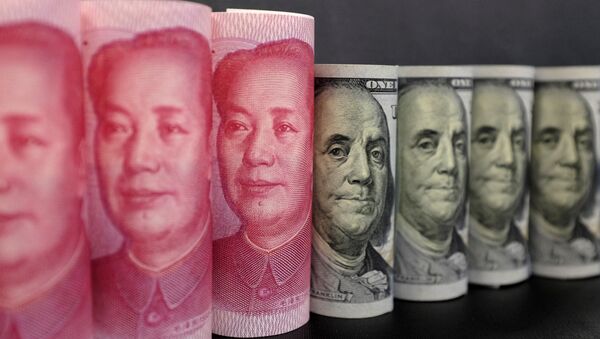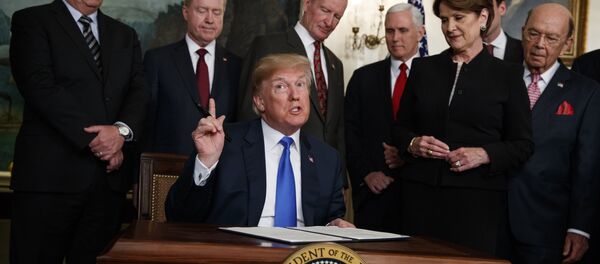The petro-yuan may play into the hands of both China and the US, argues Tom McGregor, a Beijing-based political analyst and Asia-Pacific Commentator at China's national TV broadcaster — CNTV, commenting on Beijing's launch of yuan-denominated crude futures contracts on the Shanghai International Energy Exchange on March 26.
"It's common sense for the Chinese to move forward on yuan-dominated China oil futures and to boost trading platforms on the Shanghai Stock Exchange and related trading floors. The Chinese love better deals and if Chinese oil and gas importers can make purchases without using the US dollar then it would cut down on costs," McGregor pointed out in an interview with Sputnik.
"What a nuisance, especially if the oil was imported from a nation other than the United States, hence all parties involved had to exchange their domestic currencies into the US dollar and switch back after delivery of the contract," he emphasized.
Due to the introduction of the yuan-denominated contracts Chinese purchasing agents can now obtain contracts with the Chinese yuan, he explained.
"[Furthermore], the Chinese who have spoken to me about this topic are hoping this will soon result in lower prices when they pay for gas for their cars," McGregor added.
Assessing the impact of Beijing's recent step, international observers noted that Chinese oil futures have the potential to turn into a full-fledged benchmark challenging Brent and West Texas Intermediate (WTI).
"In regards to China oil futures reaching a benchmark, the potential is there for it, but it won't happen overnight," the CNTV commentator highlighted. "It will take a few years, perhaps decades."
In 2017 China surpassed the US as the largest crude importer: According to the US Energy Information Administration (EIA), the country imported 8.4 million barrels of oil per day, while the US imported 7.9 million barrels.
State-owned China National Petroleum Corp.'s Economics and Technology Research Institute predicted in January that the country's apparent oil demand may rise 4.6 percent year-on-year to reach 12.05 million barrels a day in 2018, as quoted by S&P Global Platts, a global provider of energy and commodities information.
"According to recent reports, household electricity usage in Chinese households had increased over 12 percent, year-on-year last month," McGregor noted. "Additionally, trade wars will force China to boost its economy."

Petro-Yuan and US-China War of Tariffs
The ongoing tariff conflict between the US and China prompted fears of a large-scale trade war, which could hit not only the two competitors, but the rest of the globalized world.
In response, China's Ministry of Commerce imposed tariffs on $3 billion worth of US imports targeting 128 American goods on April 1, while on the next day the measure came into force.
Meanwhile, the Office of the United States Trade Representative said in a press release Tuesday that the US is going to impose additional tariffs on around 1,300 Chinese products, including "industries such as aerospace, information and communication technology, robotics, and machinery."
Washington is struggling to tackle the problem of the massive US trade deficit with China, which reached $375 billion in 2017.
The question then arises whether the petro-yuan may become a new weapon in the ongoing war of tariffs.
"Why not?" McGregor responded. "But the strategy will not prove successful, unless Beijing hopes to engage in trade wars against the US for the next decade or so. It will take years and possibly a decade or more for Chinese oil futures to become a benchmark."
The analyst continued, "Hence, the petro-yuan will have little impact on the US economy, but could help lower the value of the US dollar against other foreign currencies, which can make US exports more attractive to global markets."
"And that's great since China must deliver on a narrowing trade deficit with the US so US President Trump will soften his stance against Beijing. The petro-yuan could prove helpful to both the Chinese and Americans here. Lower valuations in the US dollar would also benefit US exporters and spark a boom in the American manufacturing sector," the CNTV commentator opined.
"The petro-yuan is a win-win solution for many of those directly impacted by it," he stressed.
The views and opinions expressed by the contributors do not necessarily reflect those of Sputnik.





